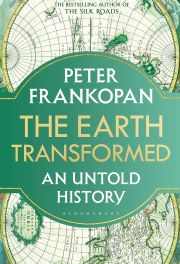The Earth Transformed: An Untold History

Peter Frankopan
Bloomsbury Publishing, £30.00
This is a prime example of a recent tendency to challenge the assumption that scientific progress entails increasingly reductionist approaches. As the author so ably demonstrates, the wider context is equally important – indeed, the virtual avalanche of diverse data now being used – for example, to build climate archives – is almost overwhelming.
What is particularly impressive is the way Peter Frankopan has integrated recent advances in our knowledge of geological and climatic change with human responses throughout history, some of a drastic nature, others resulting in democratic political systems and cultural achievements.
This ambitious project – to provide a scholarly analysis of the way the Earth’s history and ours have been shaped by often turbulent meteorological episodes – is surely a salutary warning of the urgency with which environmental strategies (for example, for climate change) demand serious attention. Even so, in the author’s opinion, “nature does not care who wins or loses and does not choose one form of biota over another” – a contentious conjecture in that ‘we don’t know what we don’t know’.
Despite its virtues, I suspect that 800 pages (and over 200 more listing references) will deter some potential readers. Surely the practical matter of keeping readers’ attention and other demands on their time are important considerations. And, despite the length, there were some gaps: for example, the very fertile recent role of bioarcheology, which is proving invaluable in revealing climatic and genetic influences on food supplies, receives little explicit attention.
Professor Ben Mepham FRSB


